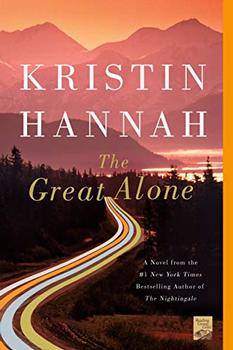Book Club Discussion Questions
In a book club? Subscribe to our Book Club Newsletter!
Please be aware that this discussion guide will contain spoilers!
- Before reading the book, what was your perception of
life in Alaska? What surprised you?
- "The wild, spectacular beauty of Alaska. It was
otherworldly somehow, magical in its vast expanse, an
incomparable landscape of soaring glacier-filled white
mountains that ran the length of the horizon, knife-tip
points pressed high into a cloudless, cornflower blue
sky." (22) The author describes the Alaskan landscape
with such electric language—what passages did you
find the most moving? Did they help you visualize
the place or inspire you? Did you find the landscape
to be in contrast to the violence of the story? Or do
you think it complemented the breathtaking feeling of
young love?
- What aspects of the lifestyle would you find the most
challenging in the wild? How would you handle the
isolation, the interdependence among neighbors, the
climate? Would you have what it takes to survive?
- "Up here, there's no one to tell you what to do or how
to do it. We each survive our own way. If you're tough
enough, it's heaven on earth." (39) What drives the
settlers in The Great Alone to Alaska? They're not all
desperate people in desperate need of a fresh start like
the Allbrights, but what could be attractive about this
unique way of life for some? What brings Large Marge
there? The Walker family? Do you think most are
hunting for something—or hiding?
- In The Great Alone, we're transported by the author
back to America in the early seventies with plot
elements such as the gas shortage, shocking news
headlines, countercultural ideas, and of course, the
wardrobe choices. If you were present for these years,
what was it like to see snapshots of it in the story? Did
it match up with your memories, or color the story for
you? What would you add?
- Did you find Cora's actions and "liberated" mind-set to
be in conflict? When we first meet Cora she's venting
about discriminatory credit practices at the bank while
sipping from a feminist-messaged coffee cup, but
we soon discover she's at a tense crossroads in her
personal life. What do you think holds her back?
- Leni sees the complexity of her parents' relationship
when in such close quarters with them in the cabin—
the rawness of their lives together. Did you think it
was going to be the weather or the violence that killed
them first?
- Discuss the forms of love within this book—crazy and
romantic love, neighborly love and compassion, love
for the natural world, and a mother's love. What else
would you add?
- "A girl was like a kite; without her mother's strong,
steady hold on the string, she might just float away, be
lost somewhere among the clouds." (118) If you have
faced the loss of a loved one, did you find this quote to
have special resonance for you? What did the author
get right about this sentiment? How else would you
describe a mother's influence? Does Cora serve such
a role for Leni—why and why not? Did your ideas
change throughout the book?
- Leni and Matthew compare their friendship with Sam
and Frodo's from The Lord of the Rings, but what other
couples from literature do you think they'd fit neatly
into the roles of?
- "This is dangerous, she thought, but she couldn't
make herself care. All she could think about now was
Matthew, and how it had felt when he kissed her, and
how much she wanted to kiss him again." (233) Do
you recall your own days of young love and that rush
of feeling? Do you think the experience is universal?
- How did the building of Ernt's wall affect you as a
reader? Did you find that the construction heightened
the suspense—or was it suffocating?
- Did you see Cora's explosive act of protection coming?
What did it feel like to read that scene? As a parent, do
you think you'd be capable of the same act, or be able
to write such a confessional letter?
- Did you hold Leni responsible in your mind for any
of Matthew's misfortune? Why or why not? How does
Leni show her devotion in the end? Did you anticipate
the kind of future that is set in motion for them at the
close of the book?
- At the end of the story, Leni ends up back in Alaska—
do you think there's an ultimate place where people
belong? How would you know if you got there?
Unless otherwise stated, this discussion guide is reprinted with the permission of St. Martin's Griffin.
Any page references refer to a USA edition of the book, usually the trade paperback version, and may vary in other editions.
